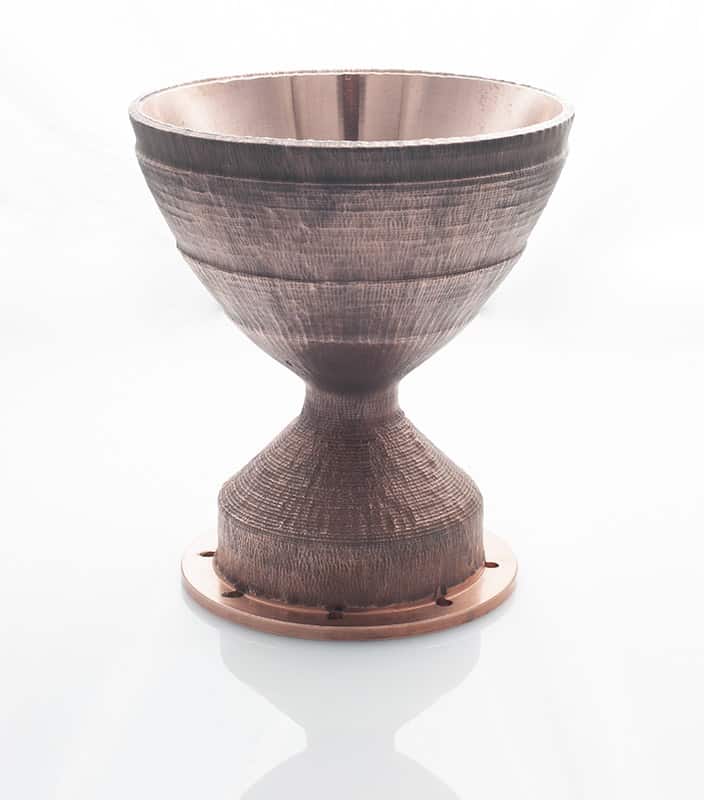SPEE3D’s high-speed technology is set to revolutionize the Space Industry with a low-cost solution to mass produce metal 3D printed rocket engines in Australia. The Modern Manufacturing Initiative have announced SPEE3D will receive $1.25 million in funding from the Federal Government’s MMI ‘Space’ Translation Stream grant, with an additional $312,000 in funding from the Northern Territory Government to ensure that SPEE3D’s ‘SPAC3D’ (pronounced: “Spaced”) project takes off.
Manufacturing space components is a billion-dollar industry set to experience strong growth in demand over the next five years. However, organisations across the world currently face one common challenge: long lead times for production-ready rocket engines.
Metal 3D printing company, SPEE3D, has the solution. The company’s cold spray technology prints metal parts 100 to 1000 times faster than more traditional metal 3D printing methods. It is also the only technology capable of printing metal parts on-demand at a cost that is more competitive than conventional manufacturing.
SPEE3D has already previously demonstrated the technology’s capability to produce rocket engine components. For example, in just three hours, SPEE3D’s large-format WarpSPEE3D printer had produced a 17.9kg Copper Rocket Nozzle Liner at a cost of less than $1,000 USD.
With their ‘SPAC3D’ project, SPEE3D will aim to pioneer the manufacturing of high-quality but inexpensive metal 3D printed rocket engines for space.
Steven Camilleri, SPEE3D’s CTO explains, “SPEE3D has developed a new way to manufacture rocket engines quickly with our advanced manufacturing process. The MMI grant will allow us to work with other partners in Australia to manufacture and test flight ready engines for the emerging industrial space market”.
The Modern Manufacturing Initiative is designed to help Australian manufacturers to scale up and create jobs to lift Australia’s manufacturing capability, drive collaboration, and identify new opportunities to access domestic and global supply chains. It provides Australian businesses with funding to support projects that translate high quality research into commercial outcomes. SPEE3D’s ‘SPAC3D’ project offers Australia’s fledgling space industry, for the first time, the opportunity to become the world’s leading manufacturer and exporter of rocket engines.
“The Government’s Modern Manufacturing Initiative is all about backing our manufacturers to be more competitive, resilient and able to take on new domestic and global markets. This matched government funding will help Effusiontech (SPEE3D) to grow its business and create jobs, while also spurring further investment in the manufacturing sector and cementing Australia’s reputation as a nation that creates high-value products,” states Christian Porter, Minister for Industry, Science and Technology.
Northern Territory Chief Minister, Michael Gunner hailed SPEE3D as a local success story. “This is another big leg up for SPEE3D who are taking the advanced manufacturing world by storm – all the way from the Top End. We are proud to back SPEE3D through our Local Jobs Fund, they are a true testament to the Territory, and its projects like SPEE3D that strengthen us as Australia’s comeback capital.”
The next stage for SPEE3D’s greenlit ‘SPAC3D’ project will be hot fire testing and validating the usefulness of additively manufactured rocket engines for commercial space vehicles.
Penn State University recently also acquired a SPEE3D Metal 3D Printing system. Penn State University’s latest investment into a LightSPEE3D Cold Spray metal 3D printer will allow the institution to advance its Additive Manufacturing (AM) capability. The Applied Research Laboratory adopting SPEE3D’s high-speed metal 3D printing technology as the latest tool for new research and development opportunities in the U.S.



